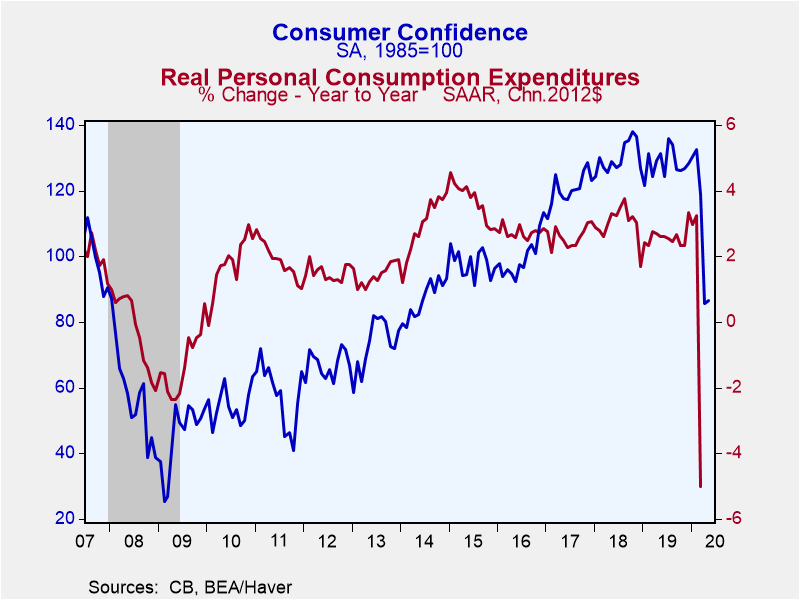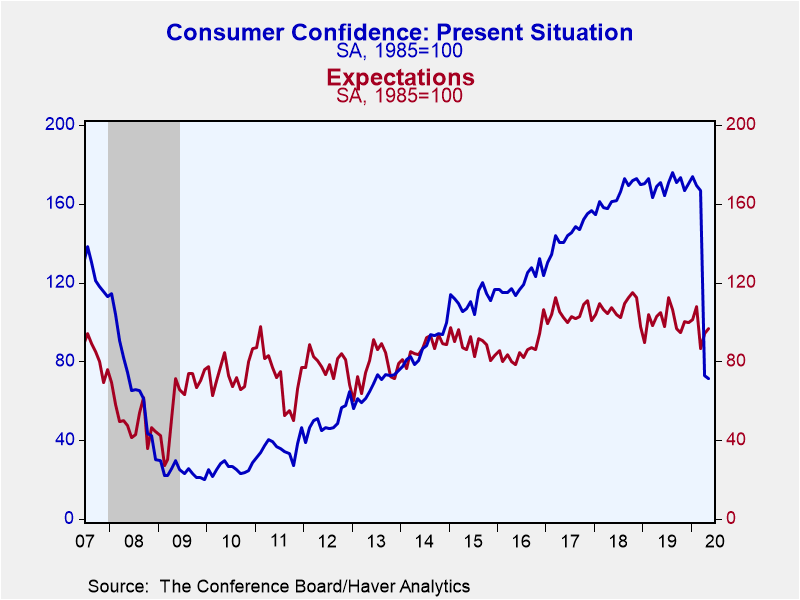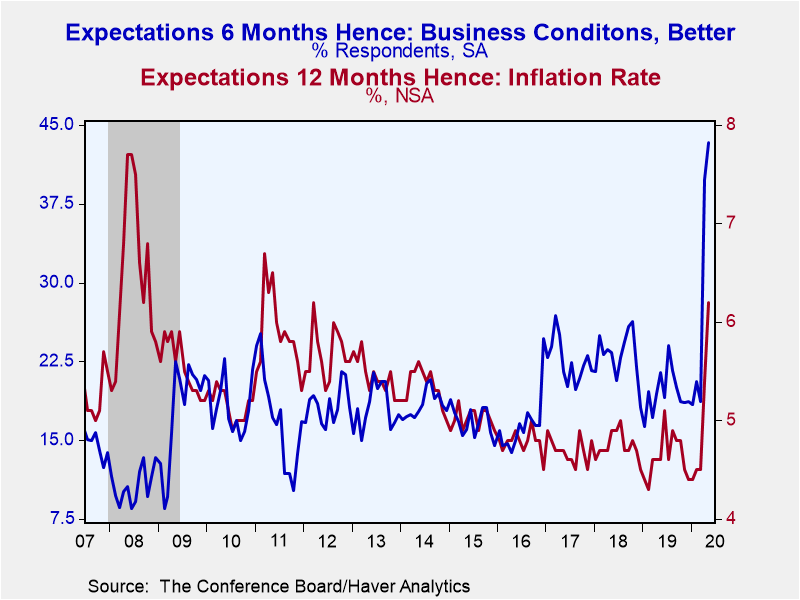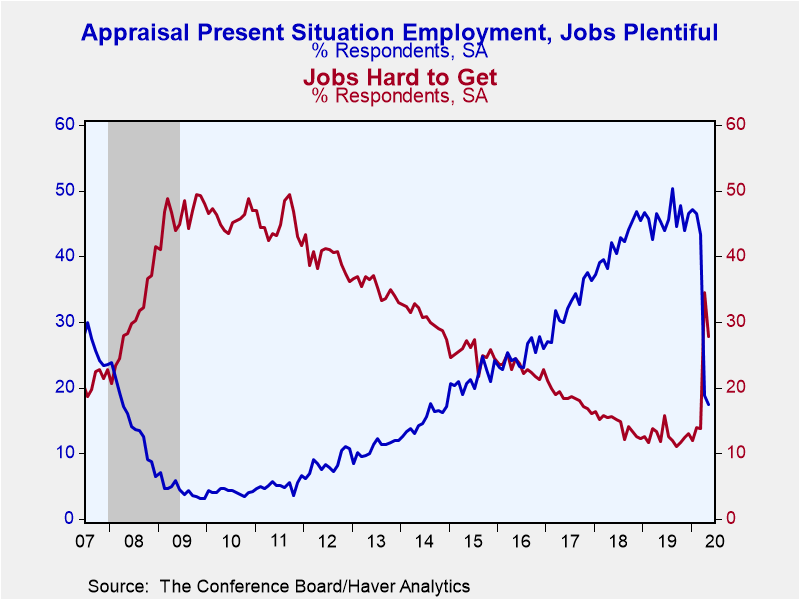 Global| May 26 2020
Global| May 26 2020U.S. Consumer Confidence Improves Slightly as Some States Open Up in May
by:Tom Moeller
|in:Economy in Brief
Summary
• Expectations for business conditions improve moderately. • Assessment of current activity weakens further. • Age groups exhibit mixed feelings. The Conference Board's Index of Consumer Confidence rose 1.1% (-34.0% y/y) this month to [...]
• Expectations for business conditions improve moderately.
• Assessment of current activity weakens further.
• Age groups exhibit mixed feelings.
The Conference Board's Index of Consumer Confidence rose 1.1% (-34.0% y/y) this month to 86.6 following a 27.9% decline during April, revised from -26.9%. Despite the recent gain, the index remained near the lowest level of confidence since June 2014. A decline to an index level of 85.0 had been expected in the Action Economics Forecast Survey. Over the last 20 years, there has been a 60% correlation between the level of confidence and the y/y change in real consumer spending.
The index of expected business conditions in six months rose 2.8%, following an 8.6% rise in April. An improved 43.3% of respondents felt that would business conditions would improve, up from the low of 18.7% in March. Thirty-nine percent of respondents felt that there would be more jobs in six months, down slightly from April but up from 16.9% in March. These gains did not, however, translate into improved earnings expectations. A still declining 14.0% of respondents felt that income would improve.
The index of current conditions fell 2.6% to the lowest level since August 2013. A greatly lessened 16.3% of respondents felt that business conditions were good, down from 39.2% in March. Jobs were viewed as hard to get by 28% of respondents, down a bit from April but still higher than 13.8% in March.
Expectations for the inflation rate in twelve months surged to 6.2% and added to April's increase from 4.5% in March. It was the highest level since March 2012, up from 4.5% this past March. Interest rates were expected to move higher in twelve months by 37.4% of respondents, up slightly from April but still nearly half the 2018 high. A greatly lessened 0.7% planned to buy a new home, down from the recent high of 2.0% in March. An improved 4.5% planned to buy a new car within six months while 46.9% planned to buy a major appliance, down from February's high of 55.0%.
By age group, the index of confidence amongst those under age 35 eroded 19.8% (-34.8% y/y) compared to improvement amongst older individuals. For respondents aged 35-54, confidence improved 5.3% (-34.1% y/y). For those over age 55, confidence gained 5.6% (-34.9% y/y).
The Consumer Confidence data are available in Haver's CBDB database. The total indexes appear in USECON, and the market expectations are in AS1REPNA.
| Conference Board (SA, % Chg.) | May | Apr | Mar | May Y/Y | 2019 | 2018 | 2017 |
|---|---|---|---|---|---|---|---|
| Consumer Confidence Index | 1.1 | -27.9 | -10.4 | -34.0 | -1.4 | 8.0 | 20.7 |
| Present Situation | -2.6 | -56.2 | -1.5 | -58.3 | 3.1 | 13.8 | 20.3 |
| Expectations | 2.8 | 8.6 | -19.7 | -7.7 | -6.0 | 2.6 | 21.1 |
| Consumer Confidence By Age Group | |||||||
| Under 35 Years | -19.8 | -23.9 | -6.7 | -34.8 | 0.3 | 2.7 | 6.4 |
| Aged 35-54 Years | 5.3 | -28.6 | -11.0 | -34.1 | -1.1 | 7.0 | 16.4 |
| Over 55 Years | 5.6 | -29.2 | -10.8 | -34.9 | -1.9 | 11.8 | 33.5 |
Tom Moeller
AuthorMore in Author Profile »Prior to joining Haver Analytics in 2000, Mr. Moeller worked as the Economist at Chancellor Capital Management from 1985 to 1999. There, he developed comprehensive economic forecasts and interpreted economic data for equity and fixed income portfolio managers. Also at Chancellor, Mr. Moeller worked as an equity analyst and was responsible for researching and rating companies in the economically sensitive automobile and housing industries for investment in Chancellor’s equity portfolio. Prior to joining Chancellor, Mr. Moeller was an Economist at Citibank from 1979 to 1984. He also analyzed pricing behavior in the metals industry for the Council on Wage and Price Stability in Washington, D.C. In 1999, Mr. Moeller received the award for most accurate forecast from the Forecasters' Club of New York. From 1990 to 1992 he was President of the New York Association for Business Economists. Mr. Moeller earned an M.B.A. in Finance from Fordham University, where he graduated in 1987. He holds a Bachelor of Arts in Economics from George Washington University.
More Economy in Brief
 Global| Feb 05 2026
Global| Feb 05 2026Charts of the Week: Balanced Policy, Resilient Data and AI Narratives
by:Andrew Cates










